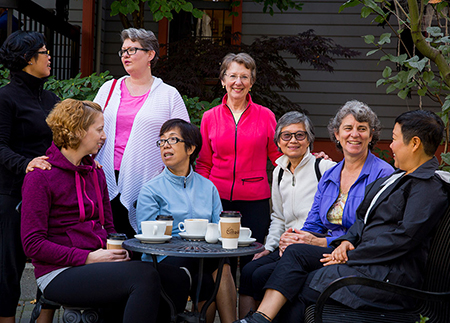Kristin Campbell doesn’t think of herself as a social coordinator. An Associate Professor of Physical Therapy, Dr. Campbell studies the role of exercise in cancer care. Her Clinical Physiology Exercise Lab is examining, among other things, the effectiveness of adding exercise to the standard of care for breast cancer in B.C.
But in the course of conducting a clinical trial to answer that question, Dr. Campbell wound up fostering a vibrant support network.
Although Dr. Campbell’s evaluation of the data isn’t complete, the participants know this much: Exercise helped them cope with the side effects of cancer treatment and offered a welcome distraction. Regular classes fostered fellowship, mutual support and an unexpected confidence. And the camaraderie that took root in the classes has blossomed into deep and very special friendships that helped them get through their ordeal.

The gym became a vital venue for sharing information, from discussing symptoms to tips on where to get wigs to, as participant Julie Donegan puts it, “laughing and joking about our condition.” They wound up staying in touch long after the cancer treatments and prescribed exercise ended.
“I couldn’t have done it without them,” Mary Chow-Humphries said. “We were a group going through the same thing, through all our surgeries and treatments.”
Dr. Campbell had identified a gap in programming for women with breast cancer, since many would be reticent to visit a public gym because they were worried about infection or things like being noticed for not having hair. Dr. Campbell hopes to be able to match gains in their physical condition with better response to treatment and quickened recovery.
The women themselves have no doubt that it helped them in other ways. Besides providing a welcome distraction, the exercise classes fostered fellowship, mutual support and an unexpected confidence.
“It got me out of the house,” Kara Horsman says. “It helped with nausea. In the beginning I thought exercise might help. My thought now is, how would I have made it without it?”
An unexpected bonus with the gym’s location was the friendly Caffè Cittadella just two blocks away. The women made it a regular post-workout stop, and sessions there cemented their close-knit relations.
Many of the participants still go to shows together, go on trips, meet up at the café, do potlucks or dragon boating, even go back to the gym. Friendships formed in the crucible of breast cancer, and the camaraderie of the gym, it seems, are lasting ones.